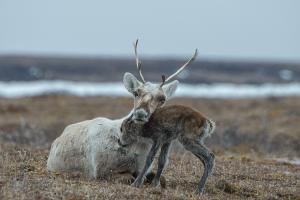
The Government of Yukon has submitted its response to the US Bureau of Land Management’s draft environmental impact statement on development in the Arctic National Wildlife Refuge (ANWR).
The response acknowledges the importance of both caribou conservation and economic development for northerners, but emphasizes that current experience and information provided in the draft environmental impact statement does not provide sufficient evidence that these risks can be effectively mitigated if development proceeds. It also reinforces that avoiding or mitigating the negative impacts of development on caribou survival must be a fundamental consideration in the design and evaluation of the proposed development in ANWR.
The Government of Yukon is requesting further analysis of alternatives to the project as well as a supplemental environmental impact statement addressing the potential adverse impacts to the Porcupine caribou herd and its subsistence users, the South Beaufort polar bear subpopulation and food security in North Yukon.
The anticipated decline in the Porcupine caribou herd resulting from development in their calving and post-calving habitats in ANWR will very likely have serious and far-reaching impacts on the Gwich’in, Na-cho Nyak Dün, Vuntut Gwitchin, Tr’ondëk Hwëch’in, and Inuvialuit Peoples as well as Alaskan Inuit and Native American Peoples in the Western Arctic who depend on these animals for food, clothing, and cultural identity. Together with our partners, we have requested further analysis of these issues and alternatives to the project. We will continue to work with all partners toward the continued health and conservation of this iconic herd.
Minister of Environment Pauline Frost
The Government of Yukon’s submission was informed by a scientific assessment, commissioned by the governments of Canada, Yukon and the Northwest Territories showing that development in the calving and post-calving range of the Porcupine caribou herd poses significant risks to one of the last healthy, large-migratory caribou herds in the world, and also to the communities who depend on it as a significant food source.
The independent scientific analysis was conducted by internationally-respected experts using more than 40 years of scientific monitoring and co-management data from the Porcupine caribou herd.
Sunny Patch
Cabinet Communications
867-393-7478
sunny.patch@gov.yk.ca
Roxanne Stasyszyn
Communications, Department of Environment
867-332-0219
roxanne.stasyszyn@gov.yk.ca